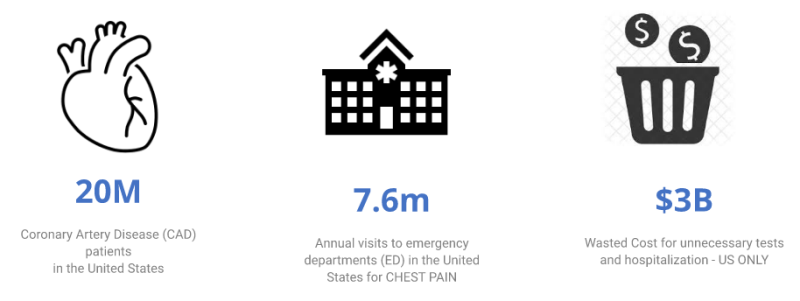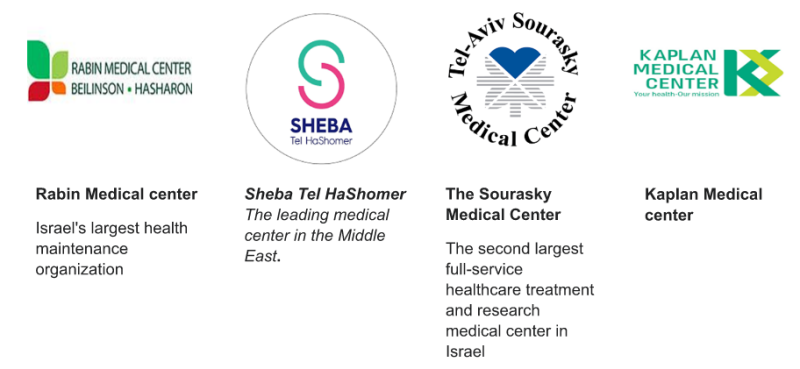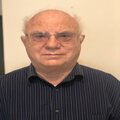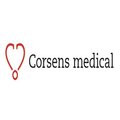
CORSENS Medical
Diagnosing heart attacks in real-time
280% of funding target
Highlights
Highlights
Is the chest pain I feel now a heart attack?
A cardiac event is a leading cause of death worldwide, yet there is currently no equipment available to diagnose it in real-time with clarity. Approximately 750,000 people in Israel, 20 million in the United States, and 300 million people worldwide have coronary artery disease (CAD) and are at risk of a heart attack. People with CAD live with constant anxiety every time they experience chest pain, which is one of the common symptoms of a heart attack, varying in intensity and location across the chest. They face a difficult decision when experiencing chest pain, as it could indicate a life-threatening condition, but not always. Should they rush to the emergency room or wait and see if the pain subsides? The current guideline is to seek immediate attention at hospital emergency rooms, but around 75% of cases turn out to be unrelated to a cardiac event. Although most of these patients use home EKG monitoring, the limitations of existing medical equipment often result in unnecessary visits to the emergency room.
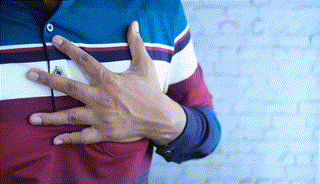
CORSENS Medical is developing an innovative solution based on a non-invasive sensor that can be attached to the chest to diagnose whether chest pain is related to a cardiac event or not. The complete diagnosis process takes only a few minutes, with all necessary indicators transferred to the cardiologist via a remote digital medicine platform based on cloud services within 30 seconds of attaching the sensor to the chest.
.bmp)
CORSENS Medical has achieved this unique capability by directly diagnosing changes in the contraction force of the heart muscle. This parameter indicates the heart's ability to circulate the required blood output. Chest pain is a warning sign of ischemia (blockage of the coronary arteries) and indicates that the heart muscle is not receiving the amount of oxygen it needs to function properly. A decrease in the contraction force of the heart muscle definitively indicates a blockage in the coronary arteries, which prevents normal blood supply to the heart muscle, ultimately leading to a heart attack.
.gif)
CORSENS Medical has made significant progress toward implementing the solution in the community:
- Completion of models for early diagnosis of ischemia and myocardial infarction (heart attack).
- Registered patents on the ability to diagnose if chest pain indicates a heart attack, as well as the ability to evaluate improvement.
-
A successful clinical trial was carried out in the catheterization lab at Ziv Hospital in Safed with the participation of 27 patients during the catheterization process they went through. During the entire cauterization process, the CORSENS sensor was attached to the patient's chest and the contraction force of the heart muscle was continuously monitored. The moment of occlusion of the centric artery was detected by a CORSENS sensor (a situation that simulates a cardiac event, in which the blood flow to the heart stops due to the inflation of a balloon during the singulation) within 20 seconds and indicated the existence of a serious cardiac event due to a significant decrease in the contraction force of the heart muscle.
-
The company received initial FDA approval confirming that its product can be used as a tool to measure the timing of certain events in the cardiac cycle for the adult population.
-
Letter of Intent (LOI) has been issued to launch clinical research in the cardiology departments of four leading hospitals in Israel: Rabin Medical Center (Beilinson Petah Tikva, Sheba Medical Center (Tel Hashomer), Sourasky Medical Center (Ichilov Tel Aviv), and Kaplan Medical Center.
-
In August 2022, the company received approval to receive a non-dilutive grant of half a million dollars from the Singapore Israel Industrial R&D Fund. This grant is part of Singapore and Israel's technological and commercial cooperation.
-
A cooperation agreement has been signed with WEB-Biotechnology from Singapore to integrate CORSENS Medical technology into a license agreement for the development of a product to be marketed in Southeast Asia. This project falls under the ambit of the Singapore-Israel Fund.
Patients suffering from CAD (arteriosclerosis) do not have a clear answer to help them decide whether to go to the emergency room immediately or not. Every minute counts when it comes to saving their lives, but in reality, they may not need to go to the emergency room as there is over a 70% probability that it is not necessary. These patients live in a constant state of stress and fear every time they experience pain or discomfort in their chest, wondering if it is a heart attack.
The solution offered by CORSENS Medical enables immediate, real-time identification of the chest pain by attaching a tiny sensor to the patient's chest. This test can be conducted from anywhere and at any time, providing findings that will aid the cardiologist in making a diagnosis. The diagnosis can be completed within a few minutes by connecting to a telemedicine platform that provides 24/7 service, such as Shahal or Natali in Israel.
The innovative solution offered by CORSENS Medical analyzes the mechanical function of the heart muscle, specifically the contraction force of the heart muscle, which in turn determines the actual blood output pumped into the heart muscle.
In contrast to all the measures that exist in the health system today, including emergency rooms, health insurance funds, and community diagnosis, which mostly rely on the identification of electrical signals of the heart (ECG) and are very limited in their ability to detect a cardiac event, CORSENS Medical's solution offers a more effective approach.
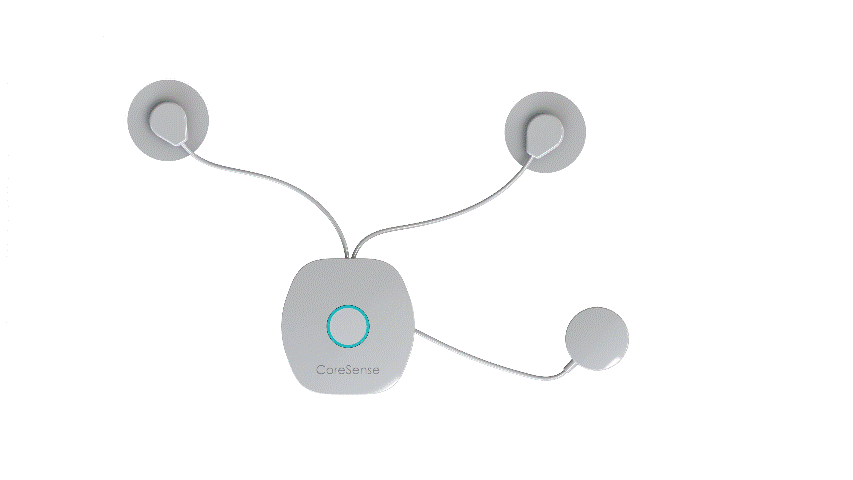
CORSENS Medical's solution provides relief to hundreds of millions of patients worldwide who have been diagnosed with coronary artery blockage (arteriosclerosis), including those who have experienced a heart attack or undergone catheterization. In the United States alone, approximately 20 million patients are affected each year, representing a potential market size of around $4 billion annually, and a global market size exceeding $30 billion. The company's business model is based on a hybrid revenue model, based on access to the telemedicine platform.
Pitch
Pitch
Currently, cardiologists lack reliable options to rule out a heart attack for chronic patients who suffer from CAD and experience chest pain.
This uncertainty also leads to patients often rushing to the hospital when experiencing chest pain and undergo various tests to determine its cause. This can lead to physical and psychological stress and diminishes their quality of life. The fear of a cardiac complication and the necessity of visiting the Emergency Room (ER) for every chest discomfort occurrence can be frustrating for patients. The diminished quality of life resulting from Non-Cardiac Chest Pain (NCCP) is well-recognized, and it is increasingly being considered a main driver of the condition, along with psychiatric disease. Several studies have shown a correlation between psychiatric disease and quality of life indicators such as stress, anxiety, worry, and perceived lack of control, and their potential roles as inciting and/or aggravating factors in NCCP.
Numerous studies indicate that approximately 75% of cases involving chest pain are not related to cardiac events or heart attacks. Fear of a heart attack often leads patients to seek emergency care, making it the second most common reason for ER visits worldwide. For instance, in England, out of 700,000 individuals who visit hospital emergency departments annually with chest pain, only around 150,000 are diagnosed with a heart attack (a mere 22% of the cases). The absence of Remote Heart Attack Diagnosis solutions poses a significant challenge for healthcare providers and patients suffering from CAD when dealing with emergencies.
Going to the emergency room when the main complaint is chest pain is a global problem that costs tens of billions of dollars a year.
In addition to the physical and psychological discomfort experienced by patients due to the uncertainty surrounding their medical condition, healthcare systems worldwide incur significant costs from unnecessary tests and hospitalizations. This places a heavy burden on emergency rooms and medical teams. In the United States alone, the cost of such unnecessary procedures to rule out a heart attack amounts to billions of dollars annually.
.jpg)
Solution
To solve all the aforementioned problems, CORSENS Medical has developed the CORSENS Cardiac Monitor (CCM), which integrates wearable sensors and a cloud-based decision-making algorithm. The CCM helps patients seek emergency treatment earlier by providing qualified specialists with real-time data to advise patients to attend the nearest Emergency Room as quickly as possible. This also helps to avoid overcrowding ERs with Non-Cardiac Chest Pain (NCCP) patients.
CORSENS Medical has developed a non-invasive chest sensor that measures heart muscle contraction force through micro-oscillations transmitted to the chest during contraction. These signals provide valuable information about heart timing, rhythm, and efficiency. By using artificial intelligence and computational algorithms, we can determine whether a patient's chest pain is related to an ischemic event in the heart muscle (heart attack) or not related to a cardiac event. Via Bluetooth, the sensor is activated and controlled through a mobile application installed on the patient's phone, and the information is transmitted to a cloud infrastructure through the cellular network. The algorithmic analysis of the sampled information is performed in the cloud and is then transferred to the doctor's computer. The entire process takes approximately three minutes, after which a video call is initiated between the doctor and patient through the app to provide guidance on next steps.
A telecardiology-based Non-Invasive Cardiac Performance Sensor (CPS).

Clinical Evidence
The company has completed the development of a prototype that underwent a successful initial clinical trial to demonstrate its feasibility in the catheterization laboratory at Ziv Hospital in Safed. The trial was led by the lead researcher, Dr. Majdi Halavi, who is also the Director of the Cardiology Department.
During catheterization, a balloon is inflated to proactively block the blood vessel for approximately 20 seconds, completely stopping blood flow to the heart muscle and inducing a controlled heart attack. Throughout the procedures, the CORSENS Medical sensor measured the heart muscle's contraction force and detected a decrease in force when the balloon was inflated. Upon releasing the balloon and restoring blood flow to the heart muscle, the sensor also detected an immediate return to normal contraction force.
.jpg)
Following the successful completion of the feasibility clinical study at Ziv Hospital in Safad, CORSENS Medical aims to conduct large-scale clinical pilots with the cardiology departments of leading hospitals in Israel to validate the sensitivity and specificity of its solution.
.jpg)
In August 2022 CORSENS Medical Won a $1M program grant from (SIIRD), (Singapore Israel Industrial R&D Foundation), a collaboration between Enterprise Singapore (ESG) and the Israel Innovation Authority that aims to promote, facilitate and support joint industrial R&D collaboration between Singapore-based and Israel-based companies across various industries. CORSENS Medical was selected as an exclusive medical technology startup to join the global support of the med-tech ecosystem, and develop life-saving, life-enhancing health and wellness solutions for patients worldwide.

CORSENS Medical is embarking on a lucrative collaboration program with Spyder, a Singapore-based web biotechnology company, under the auspices of SIIRD. With funding from the foundation, CORSENS Medical technology will be embedded in Spyder's product to introduce Telecardiology monitoring in Southeast Asia through partnership with local collaborators in the region.
Patented medical technology
The company has secured full patent protection for two patents approved in 2018 and 2019. The first patent enables quantitative analysis of whether the chest pain experienced by the patient is a cardiac event, while the second patent allows assessment of the improvement in blood flow to the heart muscle at the end of the catheterization process. CORSENS Medical technology uses changes in the contraction force of the heart muscle to qualitatively assess the amount of blood ejected from the heart every minute, allowing effective differentiation between chest pain associated with a cardiac event and chest pain not caused by a cardiac event. This diagnosis is made by measuring the micro-oscillations transmitted to the chest using an accelerometer, ECG sensor, and microphone, and evaluating the contraction force of the heart muscle with each beat.
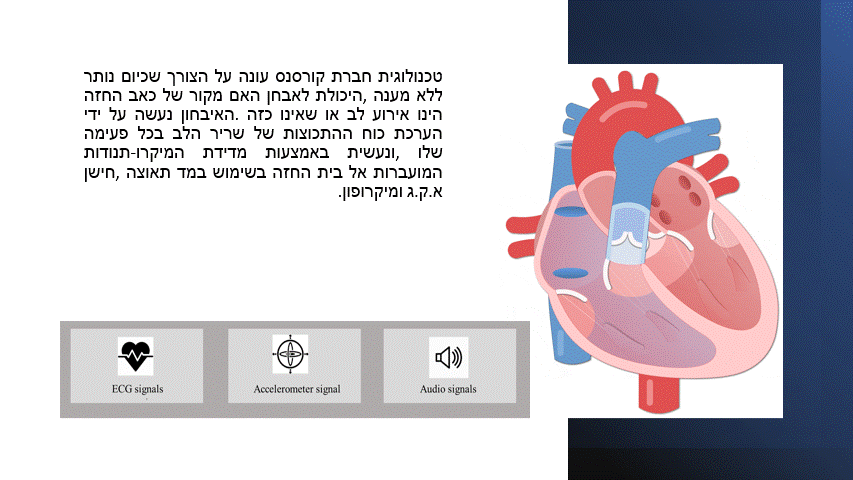
Our goal is to improve the lives of hundreds of millions of patients worldwide by reducing their need for emergency care and saving billions of dollars for healthcare systems.
Ischemic heart disease, also known as CAD, places hundreds of millions of people at risk of experiencing a heart attack. According to studies, approximately 35% of these patients are likely to suffer another heart attack.
TTens of millions of patients suffering from heart disease experience constant anxiety when they feel even the slightest murmur in their chest. The fear that it might be a cardiac event makes it very challenging for them. Often, they end up going to the hospital to either rule out their fear or, worse, confirm it. CORSENS Medical aims to become the first company in the world to fulfill the vital need of these tens of millions of people worldwide. CORSENS Medical aims to provide them with the ability to diagnose their condition quickly and in real-time, allowing them to communicate with their doctor during these crucial moments. This will enable them to make informed decisions on whether to rush to the emergency room because of a heart attack. Currently, such an ability is not available.
CAD occurs when plaque accumulates on the walls of arteries that supply blood to the heart and other organs in the body. Chest pain and discomfort are the most prevalent symptoms of CAD. Angina, which is a form of chest pain, can result from excessive plaque buildup in the arteries, causing them to narrow. Clogged arteries can impede blood flow to the heart muscle and other parts of the body, leading to chest pain.
CORSENS Medical provides real-time access to the diagnosis of the source of chest pain from anywhere and at any time. This can potentially save lives in the case of a heart attack, as well as alleviate the burden of patients and the emotional stress of waiting for hours until a diagnosis is received. Additionally, it can prevent unnecessary hospitalization and multiple tests to rule out a cardiac event, thus saving resources in the healthcare system.
Competition
At present, there is no commercial solution that provides a real-time diagnosis of chest pain to indicate if it is a cardiac event (heart attack). CORSENS Medical aims to become the first company to offer such a solution to heart patients suffering from CAD. This solution will be accessible in their daily lives, giving them peace of mind by allowing them to receive a quick diagnosis from a cardiologist via a 24/7 digital health platform.
The existing solutions for monitoring patients in the community are categorized into two groups: wearable solutions such as watches and sensors attached to the chest, and implanted sensors.
Implant-based solutions are expensive, require invasive surgical procedures for implantation, need continuous invasive maintenance due to battery life, and can cause discomfort for patients. Companies such as VitalConnect, CardioMEMS, and Sensible Medical offer monitoring solutions based on an implanted component. These solutions monitor the electrical signals of the cardiac activity cycle.
Non-invasive wearable solutions, such as watches or sensors attached to the chest, perform functional assessments but cannot provide an unequivocal diagnosis of the source of chest pain. This is because, like implant-based solutions, they rely on the diagnosis of electrical signals during cardiac activity.
The current solutions, both implant-based and wearable, focus on diagnosing electrical signals and identifying arrhythmias. However, they cannot diagnose a cardiac event in many cases where arrhythmias are not present. Such equipment is suitable for ongoing monitoring to detect arrhythmias, such as atrial fibrillation and variations from the norm, to signal to the subject that they may need to contact their doctor. These solutions are not intended to diagnose the cause of chest pain and alert patients in real time to a potential heart attack.
VISION
A long-term solution for patients suffering from ischemic heart disease using remote monitoring technology and telecardiology based on non-invasive sensing means for home use, and cloud services based on algorithms, including artificial intelligence.
Thanks to your investment, CORSENS Medical will significantly improve the quality of life for patients suffering from heart failure, as well as the healthcare system worldwide. CORSENS Medical offers a long-term monitoring solution for patients that provides immediate notification when a cardiac event occurs, allowing for quick diagnosis and prevention of unnecessary hospitalizations and tests. Additionally, the company aims to build the world's largest database, allowing for accurate identification of the stages of cardiac event development, which will help gauge the severity of the situation and maximize treatment effectiveness and reactivity to a cardiac event.
Team
Team
|
|
|
|
|
|
|
|
|
|
|
|
|
|
